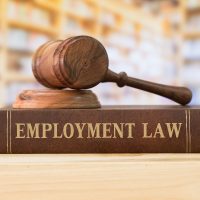New Year, New Labor and Employment Laws

While the California legislature wrapped up its work a couple of months ago, many of the laws passed in the recent 2023-2024 legislative session didn’t kick in until January 1, 2025. The Assembly passed many such laws related to the workplace, including a host of wage and hour laws addressing various types of leave and the minimum wage. In addition, the state increased protections for whistleblowers and addressed discrimination based on national origin and people discriminated against based on a combination of protected characteristics.
Below we take a look at some of the biggest changes California employees and employers will want to be aware of. In the coming months we will look at some of these changes in more detail as well as other new employment laws now in effect. If you are a Bay Area employer or employee with employment law issues to address, contact attorney Richard Koss to share your concerns with an experienced and dedicated San Francisco employment law attorney.
Paid Family Leave
California currently provides a paid family leave program known as family temporary disability that offers wage replacement benefits to eligible individuals who take time off from work to care for a family member who is seriously ill or to bond with a minor child within one year of the child’s birth or placement in the home for adoption or foster care. Paid family leave is also available when an employee takes off to participate in a qualifying exigency related to covered active duty or call to covered active duty of certain family members in the military.
Prior to the enactment of AB 2123, employers could require an employee to take up to two weeks of earned but unused vacation before they would be allowed to access paid family leave. AB 2123 removes that restriction for any disability commencing on or after January 1, 2025. Now eligible employees can immediately access paid family leave for qualifying circumstances.
Time Off for Crime Victims
California law already protects violent crime or abuse victims from employment discrimination for taking time off to appear in court as a witness or other related purposes, and employers must reasonably accommodate a domestic violence, sexual assault, or stalking victim’s request for an accommodation to provide for their safety at work. In addition, the Healthy Workplaces, Healthy Families Act of 2014 requires employers to provide paid sick leave to victims of violent crimes as mentioned above.
Assembly Bill 2499 (AB 2499) revises these laws to make it an unlawful employment practice to discriminate against crime victims taking time off. Rather than listing specific crimes, the law now protects employees who were the victim of a “qualifying act of violence” as defined in the law. The bill also protects employees taking time off work for a family member who is a victim. Employers with 25 or more employees are covered under this latter provision of the new law.
Minimum Wage Increase
California will kick off 2025 with a pay raise for all minimum-wage workers. Starting on January 1, the minimum wage rises to $16.50 per hour for all workers, regardless of the size of the employer’s workforce. And since the salary basis for exempt employees is tied to the state’s minimum wage (exempt white-collar executive, professional and administrative employees are guaranteed double the minimum wage), their minimum annual salary will rise to $68,640, equivalent to $33.00 an hour times 2,080 hours.
Whistleblower Rights and Protections
Under current law, employers must post several notices in the workplace, and among the required postings is a notice to employees of their whistleblower protection and rights. While it’s up to the Labor Commissioner to come up with a specific notice outlining these rights and responsibilities, AB 2299 codifies that requirement as well as the employer’s duty to post such notice, starting January 1.
Another Gem Added to the Crown Act
Many laws in California, including the Unruh Civil Act, the California Fair Employment and Housing Act (FEHA), and public policy, protect individuals from employment discrimination based on race. Since 2019, California’s CROWN Act (standing for Create a Respectful and Open Workplace for Natural Hair) has amended FEHA to define race to include “traits historically associated with race, including, but not limited to, hair texture and protective hairstyles, as defined.” AB 1815 removes the word “historically” from the law so that FEHA now defines race to include “traits associated with race, including, but not limited to, hair texture and protective hairstyles, as defined.” The new law also updated definitions for “race” and “protective hairstyle” in the Unruh Civil Rights Act, removing the “historically” adverb. This change broadens protections for employees.
Driver’s License as a Job Requirement
As part of FEHA’s prohibition of national origin discrimination, employers cannot discriminate against employees (or job applicants) based on whether they possess a driver’s license. Now, thanks to SB 1100, employers cannot draft a job posting that requires applicants to have a driver’s license “unless the employer reasonably expects the duties of the position to require driving and the employer reasonably believes that satisfying that job function using an alternative form of transportation would not be comparable in travel time or cost to the employer…”
Intersectionality
The list of protected characteristics in California employment law is extensive, including, for example, sex, race, color, religion, ancestry, national origin, disability, medical condition, genetic information, marital status, sexual orientation, veteran or military status, citizenship, primary language, and immigration status. The law protects not only people who have those characteristics but also workers who are perceived to have such characteristics or who are associated with people who have or are perceived to have a protected characteristic.
Along comes SB 1137, protecting employees from discrimination “not just because of one protected trait, but also because of the combination of two or more protected bases.” Discrimination against lesbian women of color is an example of intersectionality. Without this added protection, an employer could argue an employee was not discriminated against based on a single protected characteristic because the employer shows no pattern of discrimination toward other workers with that one characteristic (e.g., sexual orientation, gender or race alone).
Contact Attorney Richard Koss for Help With Employment Law in San Francisco
If you are a Bay Area employer or employee dealing with an employment law issue, contact employment law attorney Richard Koss by calling 650-722-7046 on the San Francisco Peninsula or 925-757-1700 in the East Bay. We wish you a prosperous, safe and productive New Year.


